air condition MAZDA MODEL RX 8 2006 Owners Manual (in English)
[x] Cancel search | Manufacturer: MAZDA, Model Year: 2006, Model line: MODEL RX 8, Model: MAZDA MODEL RX 8 2006Pages: 434
Page 3 of 434
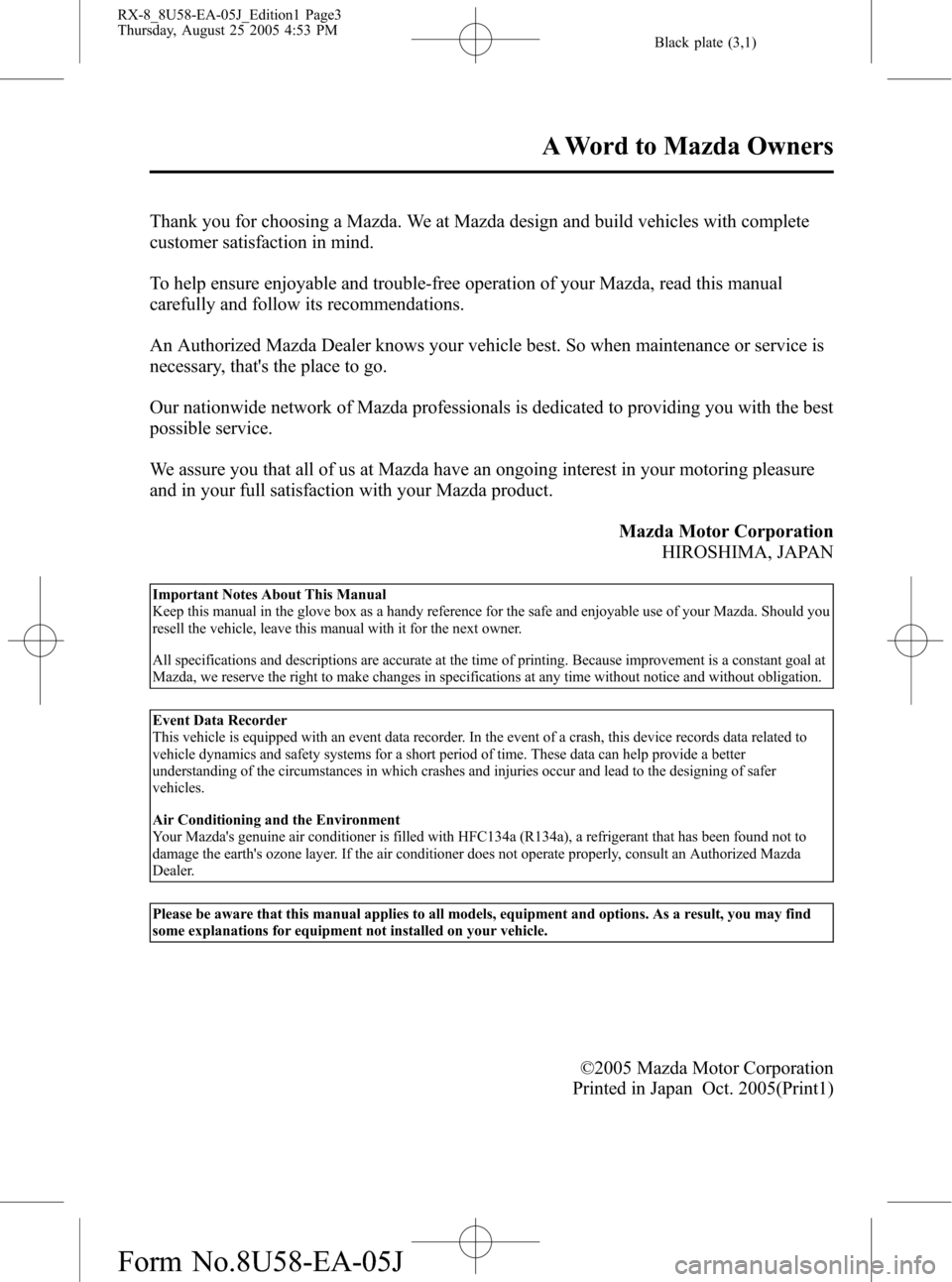
Black plate (3,1)
Thank you for choosing a Mazda. We at Mazda design and build vehicles with complete
customer satisfaction in mind.
To help ensure enjoyable and trouble-free operation of your Mazda, read this manual
carefully and follow its recommendations.
An Authorized Mazda Dealer knows your vehicle best. So when maintenance or service is
necessary, that's the place to go.
Our nationwide network of Mazda professionals is dedicated to providing you with the best
possible service.
We assure you that all of us at Mazda have an ongoing interest in your motoring pleasure
and in your full satisfaction with your Mazda product.
Mazda Motor Corporation
HIROSHIMA, JAPAN
Important Notes About This Manual
Keep this manual in the glove box as a handy reference for the safe and enjoyable use of your Mazda. Should you
resell the vehicle, leave this manual with it for the next owner.
All specifications and descriptions are accurate at the time of printing. Because improvement is a constant goal at
Mazda, we reserve the right to make changes in specifications at any time without notice and without obligation.
Event Data Recorder
This vehicle is equipped with an event data recorder. In the event of a crash, this device records data related to
vehicle dynamics and safety systems for a short period of time. These data can help provide a better
understanding of the circumstances in which crashes and injuries occur and lead to the designing of safer
vehicles.
Air Conditioning and the Environment
Your Mazda's genuine air conditioner is filled with HFC134a (R134a), a refrigerant that has been found not to
damage the earth's ozone layer. If the air conditioner does not operate properly, consult an Authorized Mazda
Dealer.
Please be aware that this manual applies to all models, equipment and options. As a result, you may find
some explanations for equipment not installed on your vehicle.
©2005 Mazda Motor Corporation
Printed in Japan Oct. 2005(Print1)
A Word to Mazda Owners
RX-8_8U58-EA-05J_Edition1 Page3
Thursday, August 25 2005 4:53 PM
Form No.8U58-EA-05J
Page 5 of 434
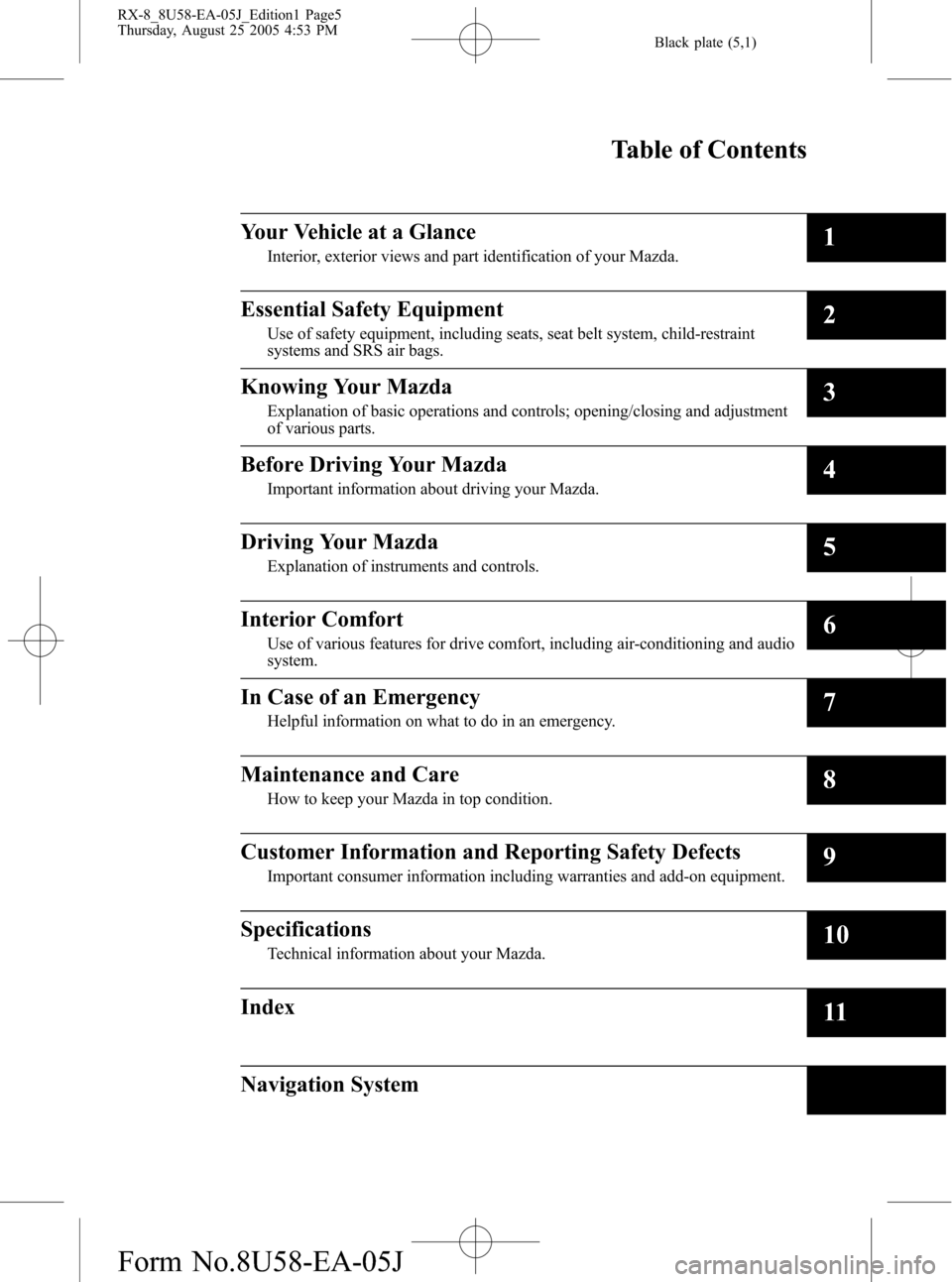
Black plate (5,1)
RX-8_8U58-EA-05J_Edition1 Page5
Thursday, August 25 2005 4:53 PM
Form No.8U58-EA-05J
Table of Contents
Your Vehicle at a Glance
Interior, exterior views and part identification of your Mazda.1
Essential Safety Equipment
Use of safety equipment, including seats, seat belt system, child-restraint
systems and SRS air bags.2
Knowing Your Mazda
Explanation of basic operations and controls; opening/closing and adjustment
of various parts.3
Before Driving Your Mazda
Important information about driving your Mazda.4
Driving Your Mazda
Explanation of instruments and controls.5
Interior Comfort
Use of various features for drive comfort, including air-conditioning and audio
system.6
In Case of an Emergency
Helpful information on what to do in an emergency.7
Maintenance and Care
How to keep your Mazda in top condition.8
Customer Information and Reporting Safety Defects
Important consumer information including warranties and add-on equipment.9
Specifications
Technical information about your Mazda.10
Index11
Navigation System
Page 33 of 434
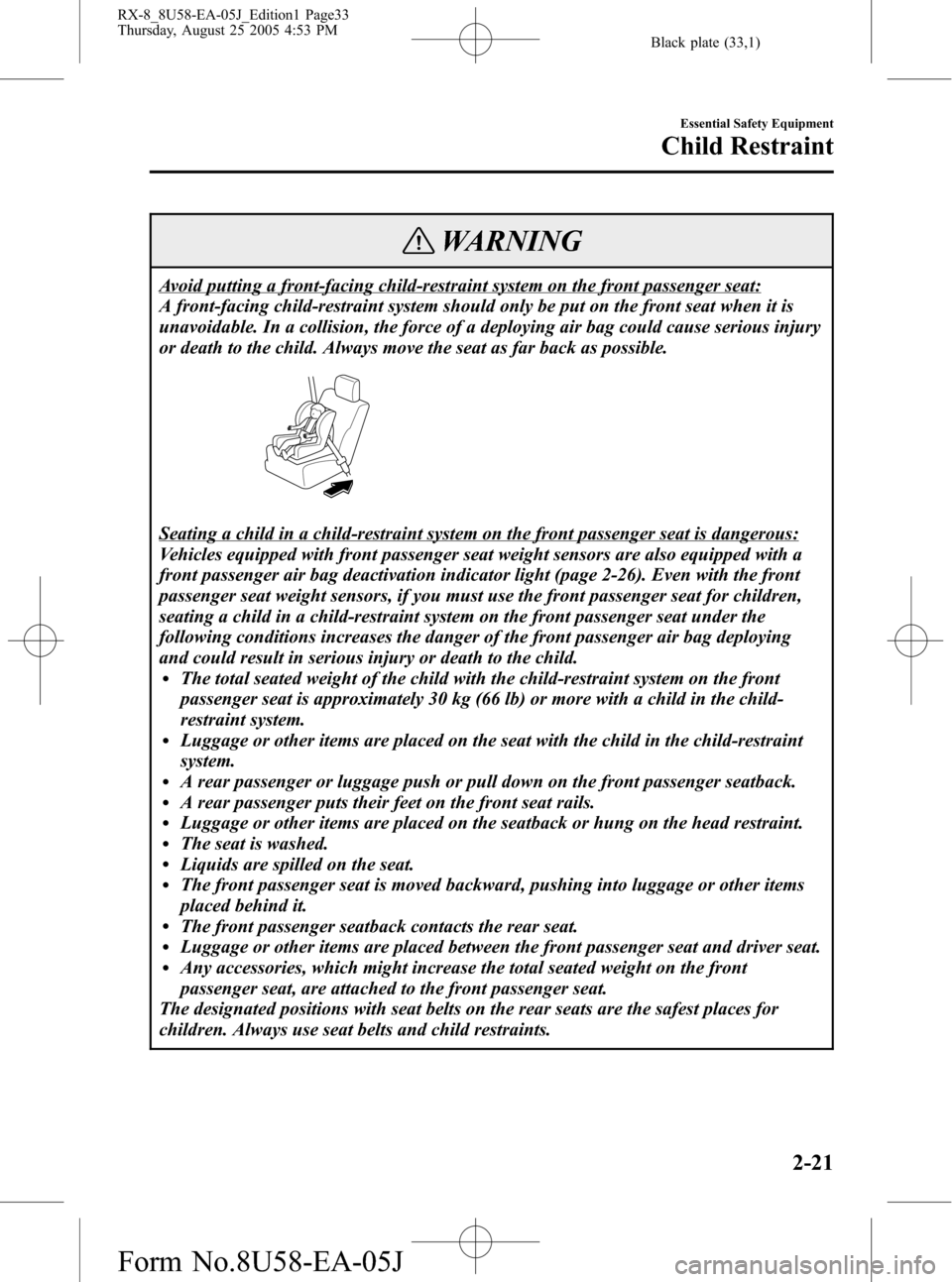
Black plate (33,1)
WARNING
Avoid putting a front-facing child-restraint system on the front passenger seat:
A front-facing child-restraint system should only be put on the front seat when it is
unavoidable. In a collision, the force of a deploying air bag could cause serious injury
or death to the child. Always move the seat as far back as possible.
Seating a child in a child-restraint system on the front passenger seat is dangerous:
Vehicles equipped with front passenger seat weight sensors are also equipped with a
front passenger air bag deactivation indicator light (page 2-26). Even with the front
passenger seat weight sensors, if you must use the front passenger seat for children,
seating a child in a child-restraint system on the front passenger seat under the
following conditions increases the danger of the front passenger air bag deploying
and could result in serious injury or death to the child.
lThe total seated weight of the child with the child-restraint system on the front
passenger seat is approximately 30 kg (66 lb) or more with a child in the child-
restraint system.
lLuggage or other items are placed on the seat with the child in the child-restraint
system.
lA rear passenger or luggage push or pull down on the front passenger seatback.lA rear passenger puts their feet on the front seat rails.lLuggage or other items are placed on the seatback or hung on the head restraint.lThe seat is washed.lLiquids are spilled on the seat.lThe front passenger seat is moved backward, pushing into luggage or other items
placed behind it.
lThe front passenger seatback contacts the rear seat.lLuggage or other items are placed between the front passenger seat and driver seat.lAny accessories, which might increase the total seated weight on the front
passenger seat, are attached to the front passenger seat.
The designated positions with seat belts on the rear seats are the safest places for
children. Always use seat belts and child restraints.
Essential Safety Equipment
Child Restraint
2-21
RX-8_8U58-EA-05J_Edition1 Page33
Thursday, August 25 2005 4:53 PM
Form No.8U58-EA-05J
Page 51 of 434

Black plate (51,1)
The front passenger air bag deactivation indicator light illuminates or is off under the following conditions:
Total seated weight on the
front passenger seatFront passenger air bag
deactivation indicator lightFront passenger front and
side air bagsFront passenger seat
belt pretensioner
system
Empty (Not occupied)
*OFF OFF OFF
Less than approx. 30 kg
(66 lb)ON OFF OFF
Approx. 42 kg (93 lb) or
moreOFF ON ON
* If the front passenger seat belt is buckled, the front passenger air bag deactivation indicator light illuminates,
however this does not indicate a malfunction.
If the front passenger air bag deactivation indicator light does not illuminate when the
ignition switch is turned to the ON position and does not illuminate as indicated in the
above chart, do not allow a child to sit in the front passenger seat and consult an
Authorized Mazda Dealer as soon as possible. The system may not work properly in an
accident.
Essential Safety Equipment
SRS Air Bags
2-39
RX-8_8U58-EA-05J_Edition1 Page51
Thursday, August 25 2005 4:54 PM
Form No.8U58-EA-05J
Page 52 of 434
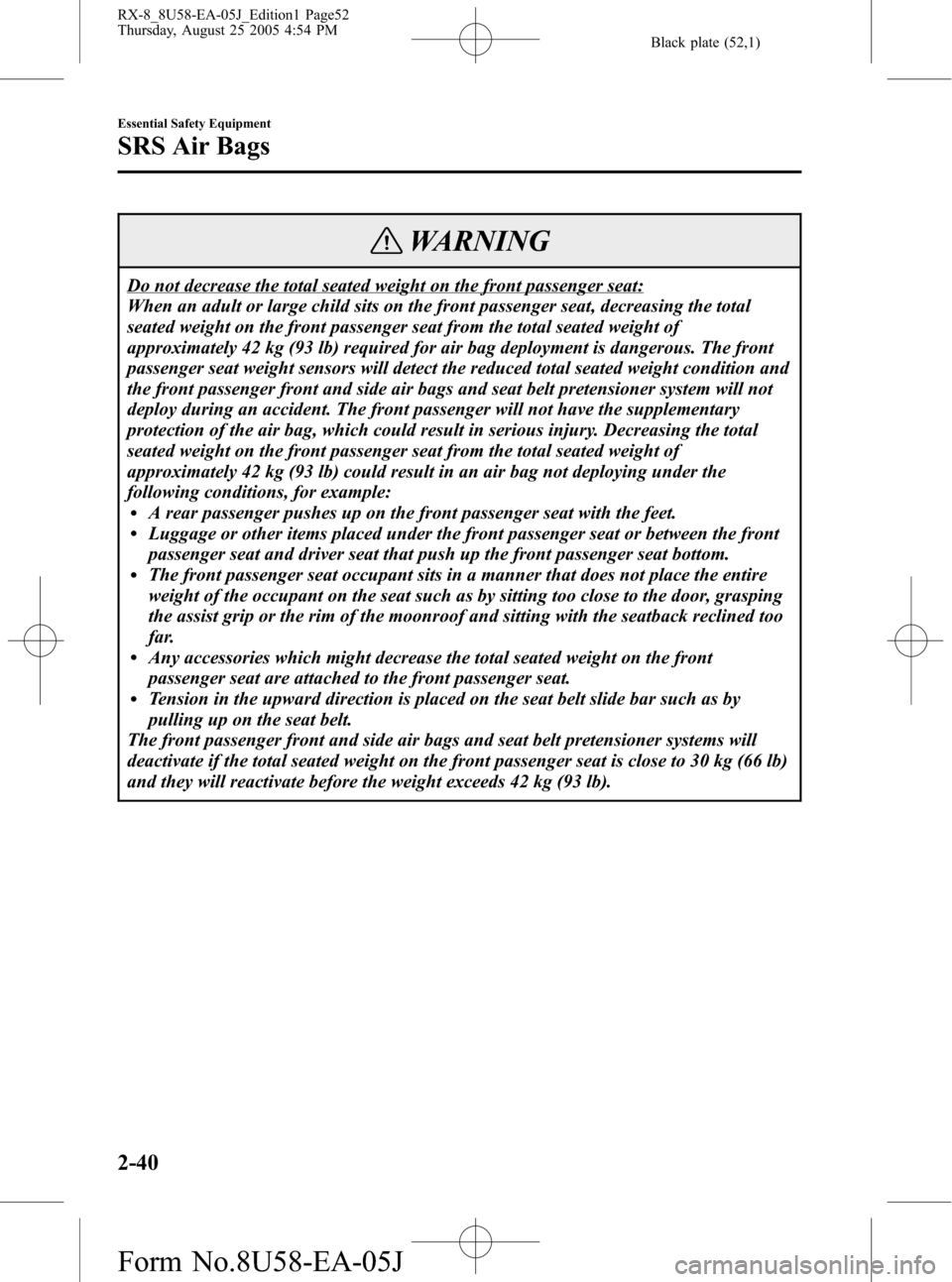
Black plate (52,1)
WARNING
Do not decrease the total seated weight on the front passenger seat:
When an adult or large child sits on the front passenger seat, decreasing the total
seated weight on the front passenger seat from the total seated weight of
approximately 42 kg (93 lb) required for air bag deployment is dangerous. The front
passenger seat weight sensors will detect the reduced total seated weight condition and
the front passenger front and side air bags and seat belt pretensioner system will not
deploy during an accident. The front passenger will not have the supplementary
protection of the air bag, which could result in serious injury. Decreasing the total
seated weight on the front passenger seat from the total seated weight of
approximately 42 kg (93 lb) could result in an air bag not deploying under the
following conditions, for example:
lA rear passenger pushes up on the front passenger seat with the feet.lLuggage or other items placed under the front passenger seat or between the front
passenger seat and driver seat that push up the front passenger seat bottom.
lThe front passenger seat occupant sits in a manner that does not place the entire
weight of the occupant on the seat such as by sitting too close to the door, grasping
the assist grip or the rim of the moonroof and sitting with the seatback reclined too
far.
lAny accessories which might decrease the total seated weight on the front
passenger seat are attached to the front passenger seat.
lTension in the upward direction is placed on the seat belt slide bar such as by
pulling up on the seat belt.
The front passenger front and side air bags and seat belt pretensioner systems will
deactivate if the total seated weight on the front passenger seat is close to 30 kg (66 lb)
and they will reactivate before the weight exceeds 42 kg (93 lb).
2-40
Essential Safety Equipment
SRS Air Bags
RX-8_8U58-EA-05J_Edition1 Page52
Thursday, August 25 2005 4:54 PM
Form No.8U58-EA-05J
Page 53 of 434
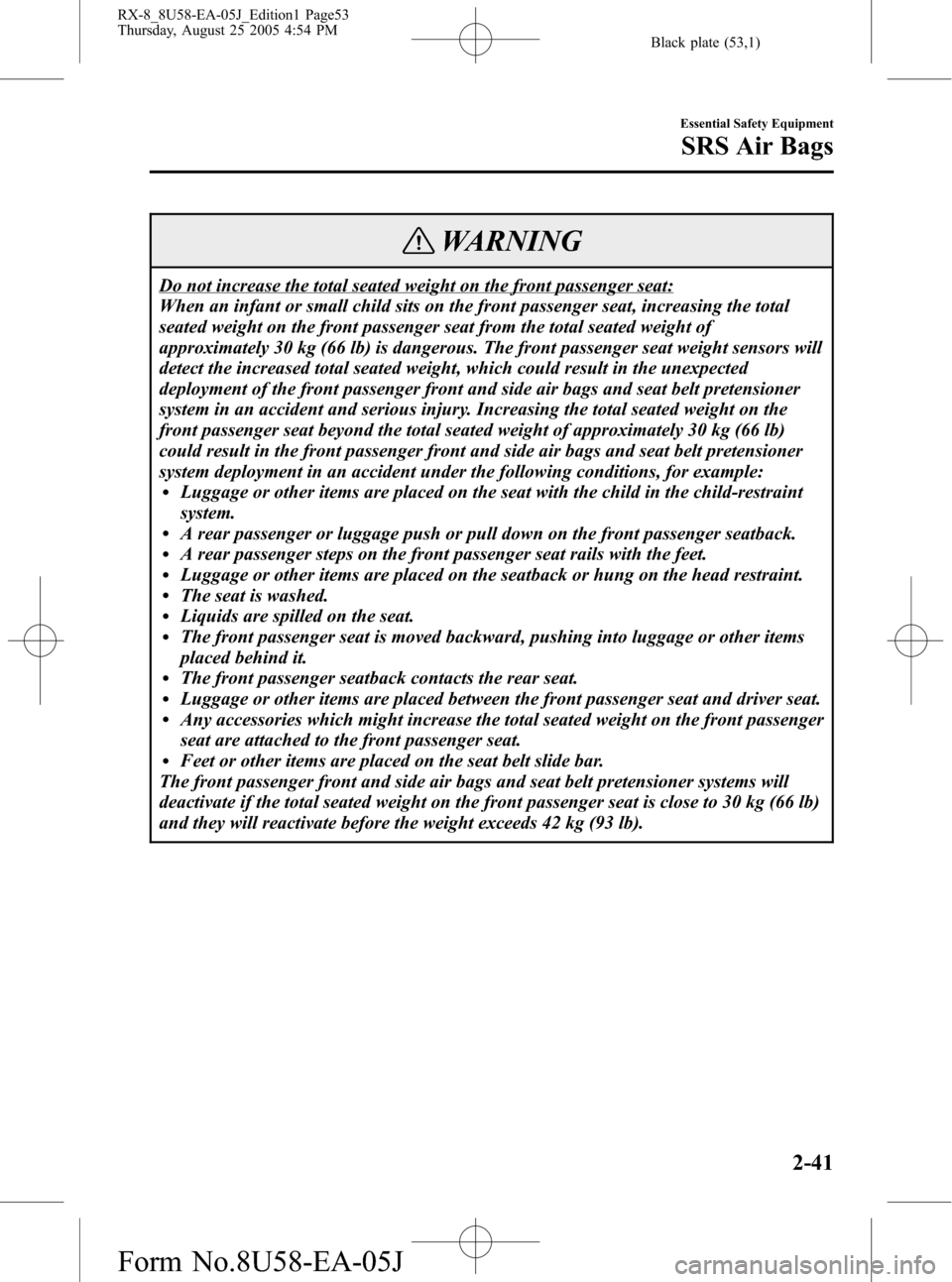
Black plate (53,1)
WARNING
Do not increase the total seated weight on the front passenger seat:
When an infant or small child sits on the front passenger seat, increasing the total
seated weight on the front passenger seat from the total seated weight of
approximately 30 kg (66 lb) is dangerous. The front passenger seat weight sensors will
detect the increased total seated weight, which could result in the unexpected
deployment of the front passenger front and side air bags and seat belt pretensioner
system in an accident and serious injury. Increasing the total seated weight on the
front passenger seat beyond the total seated weight of approximately 30 kg (66 lb)
could result in the front passenger front and side air bags and seat belt pretensioner
system deployment in an accident under the following conditions, for example:
lLuggage or other items are placed on the seat with the child in the child-restraint
system.
lA rear passenger or luggage push or pull down on the front passenger seatback.lA rear passenger steps on the front passenger seat rails with the feet.lLuggage or other items are placed on the seatback or hung on the head restraint.lThe seat is washed.lLiquids are spilled on the seat.lThe front passenger seat is moved backward, pushing into luggage or other items
placed behind it.
lThe front passenger seatback contacts the rear seat.lLuggage or other items are placed between the front passenger seat and driver seat.lAny accessories which might increase the total seated weight on the front passenger
seat are attached to the front passenger seat.
lFeet or other items are placed on the seat belt slide bar.
The front passenger front and side air bags and seat belt pretensioner systems will
deactivate if the total seated weight on the front passenger seat is close to 30 kg (66 lb)
and they will reactivate before the weight exceeds 42 kg (93 lb).
Essential Safety Equipment
SRS Air Bags
2-41
RX-8_8U58-EA-05J_Edition1 Page53
Thursday, August 25 2005 4:54 PM
Form No.8U58-EA-05J
Page 60 of 434
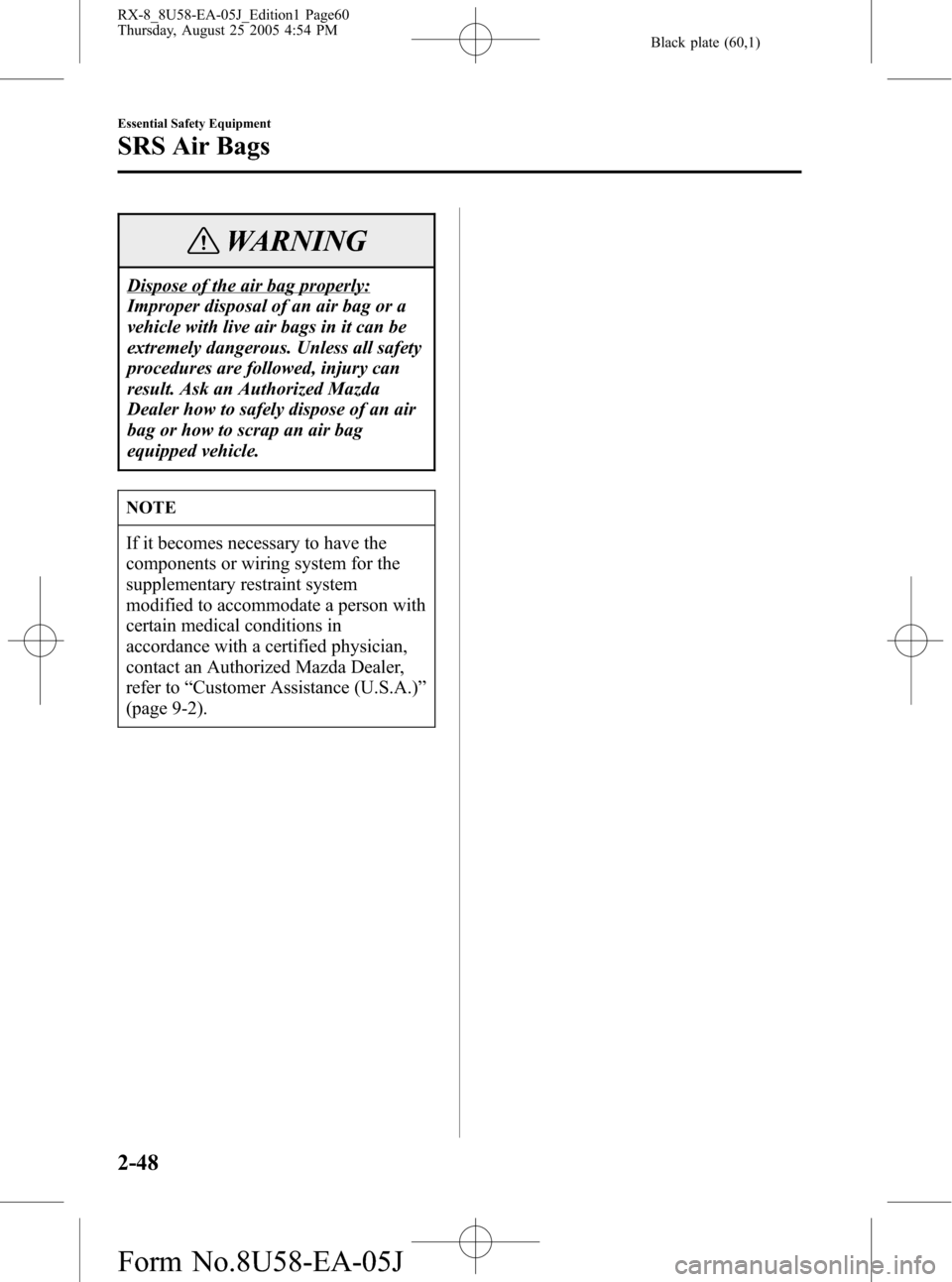
Black plate (60,1)
WARNING
Dispose of the air bag properly:
Improper disposal of an air bag or a
vehicle with live air bags in it can be
extremely dangerous. Unless all safety
procedures are followed, injury can
result. Ask an Authorized Mazda
Dealer how to safely dispose of an air
bag or how to scrap an air bag
equipped vehicle.
NOTE
If it becomes necessary to have the
components or wiring system for the
supplementary restraint system
modified to accommodate a person with
certain medical conditions in
accordance with a certified physician,
contact an Authorized Mazda Dealer,
refer to“Customer Assistance (U.S.A.)”
(page 9-2).
2-48
Essential Safety Equipment
SRS Air Bags
RX-8_8U58-EA-05J_Edition1 Page60
Thursday, August 25 2005 4:54 PM
Form No.8U58-EA-05J
Page 123 of 434
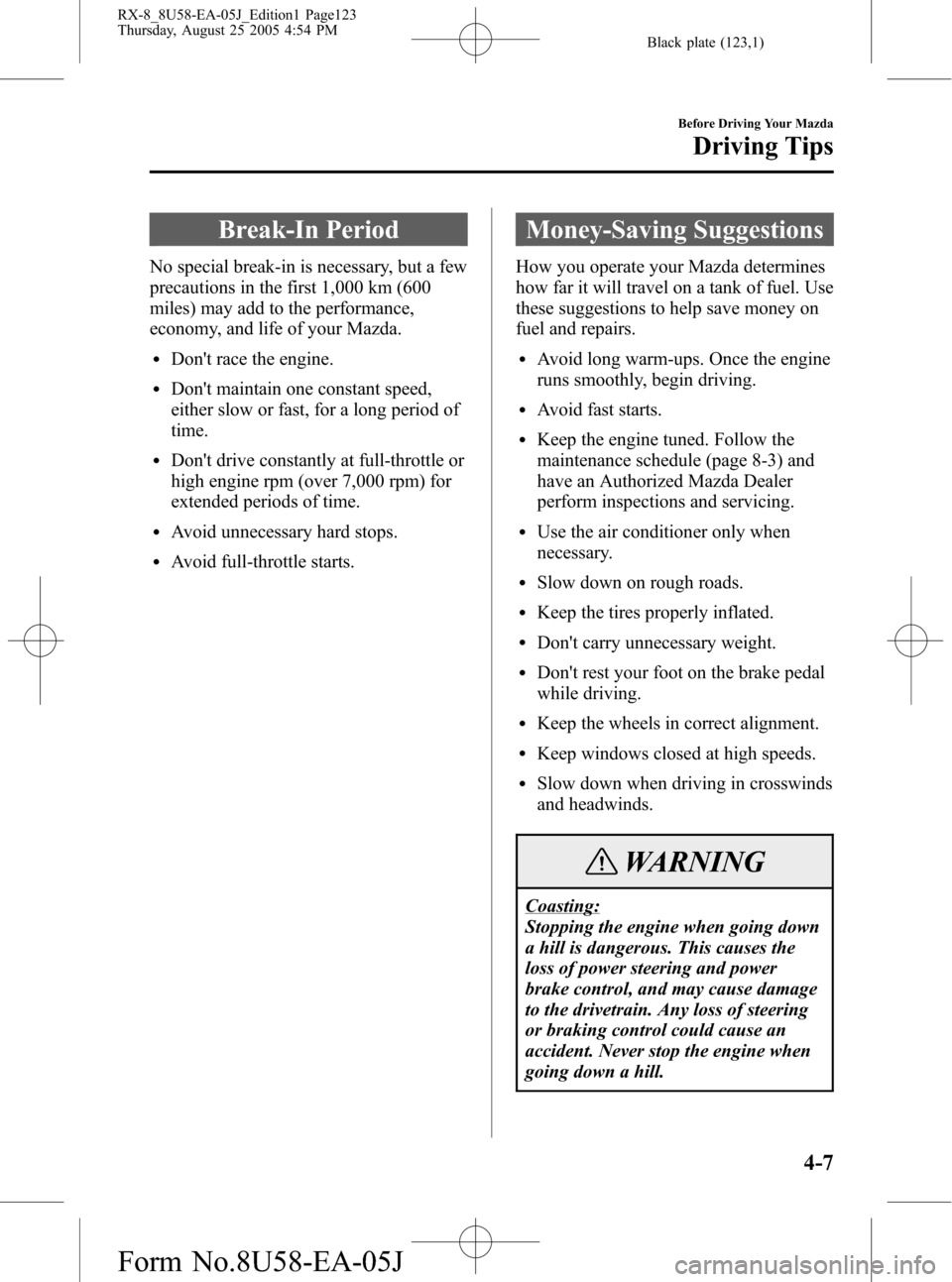
Black plate (123,1)
Break-In Period
No special break-in is necessary, but a few
precautions in the first 1,000 km (600
miles) may add to the performance,
economy, and life of your Mazda.
lDon't race the engine.
lDon't maintain one constant speed,
either slow or fast, for a long period of
time.
lDon't drive constantly at full-throttle or
high engine rpm (over 7,000 rpm) for
extended periods of time.
lAvoid unnecessary hard stops.
lAvoid full-throttle starts.
Money-Saving Suggestions
How you operate your Mazda determines
how far it will travel on a tank of fuel. Use
these suggestions to help save money on
fuel and repairs.
lAvoid long warm-ups. Once the engine
runs smoothly, begin driving.
lAvoid fast starts.
lKeep the engine tuned. Follow the
maintenance schedule (page 8-3) and
have an Authorized Mazda Dealer
perform inspections and servicing.
lUse the air conditioner only when
necessary.
lSlow down on rough roads.
lKeep the tires properly inflated.
lDon't carry unnecessary weight.
lDon't rest your foot on the brake pedal
while driving.
lKeep the wheels in correct alignment.
lKeep windows closed at high speeds.
lSlow down when driving in crosswinds
and headwinds.
WARNING
Coasting:
Stopping the engine when going down
a hill is dangerous. This causes the
loss of power steering and power
brake control, and may cause damage
to the drivetrain. Any loss of steering
or braking control could cause an
accident. Never stop the engine when
going down a hill.
Before Driving Your Mazda
Driving Tips
4-7
RX-8_8U58-EA-05J_Edition1 Page123
Thursday, August 25 2005 4:54 PM
Form No.8U58-EA-05J
Page 154 of 434
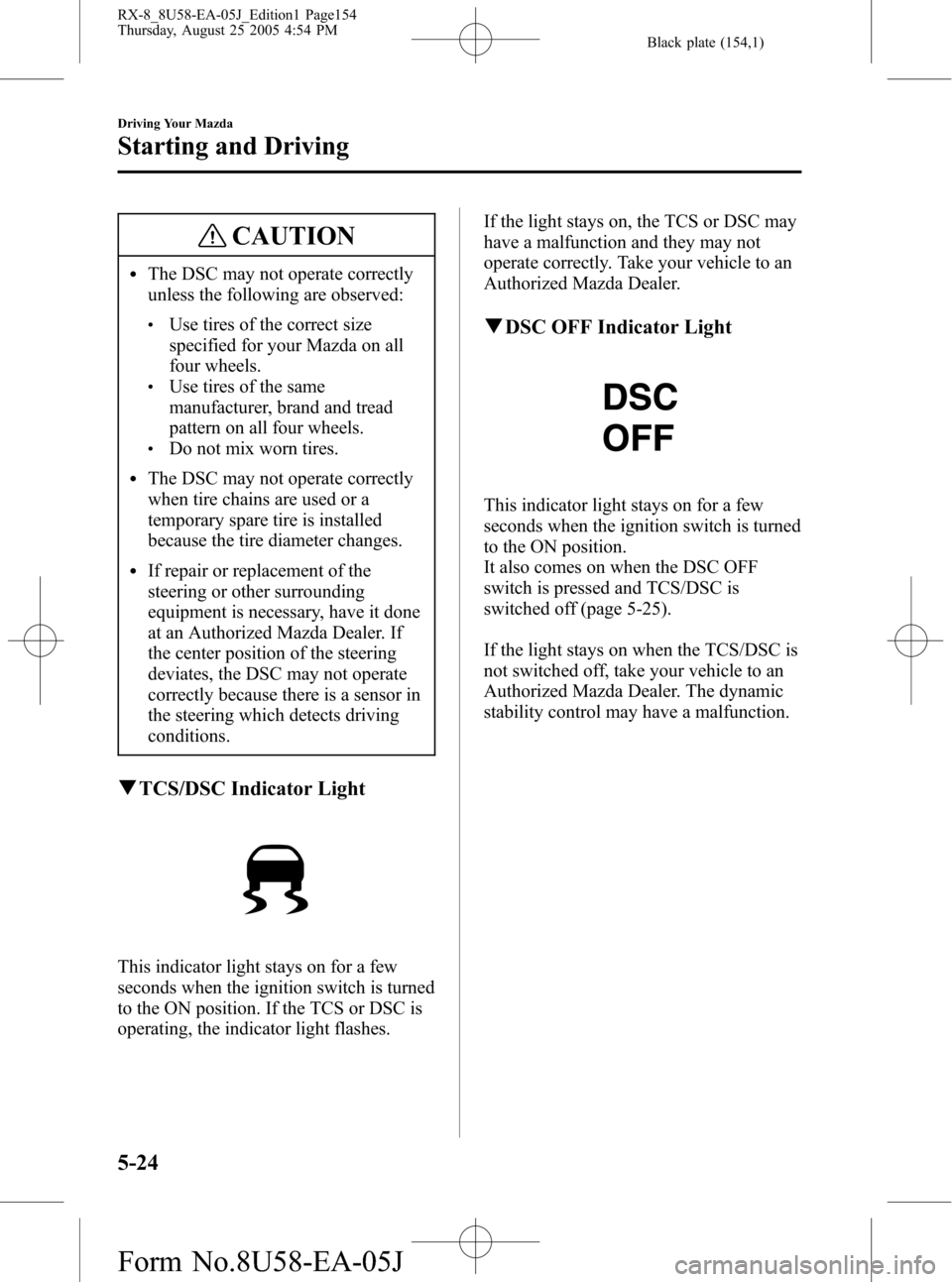
Black plate (154,1)
CAUTION
lThe DSC may not operate correctly
unless the following are observed:
lUse tires of the correct size
specified for your Mazda on all
four wheels.
lUse tires of the same
manufacturer, brand and tread
pattern on all four wheels.
lDo not mix worn tires.
lThe DSC may not operate correctly
when tire chains are used or a
temporary spare tire is installed
because the tire diameter changes.
lIf repair or replacement of the
steering or other surrounding
equipment is necessary, have it done
at an Authorized Mazda Dealer. If
the center position of the steering
deviates, the DSC may not operate
correctly because there is a sensor in
the steering which detects driving
conditions.
qTCS/DSC Indicator Light
This indicator light stays on for a few
seconds when the ignition switch is turned
to the ON position. If the TCS or DSC is
operating, the indicator light flashes.If the light stays on, the TCS or DSC may
have a malfunction and they may not
operate correctly. Take your vehicle to an
Authorized Mazda Dealer.
qDSC OFF Indicator Light
This indicator light stays on for a few
seconds when the ignition switch is turned
to the ON position.
It also comes on when the DSC OFF
switch is pressed and TCS/DSC is
switched off (page 5-25).
If the light stays on when the TCS/DSC is
not switched off, take your vehicle to an
Authorized Mazda Dealer. The dynamic
stability control may have a malfunction.
5-24
Driving Your Mazda
Starting and Driving
RX-8_8U58-EA-05J_Edition1 Page154
Thursday, August 25 2005 4:54 PM
Form No.8U58-EA-05J
Page 173 of 434
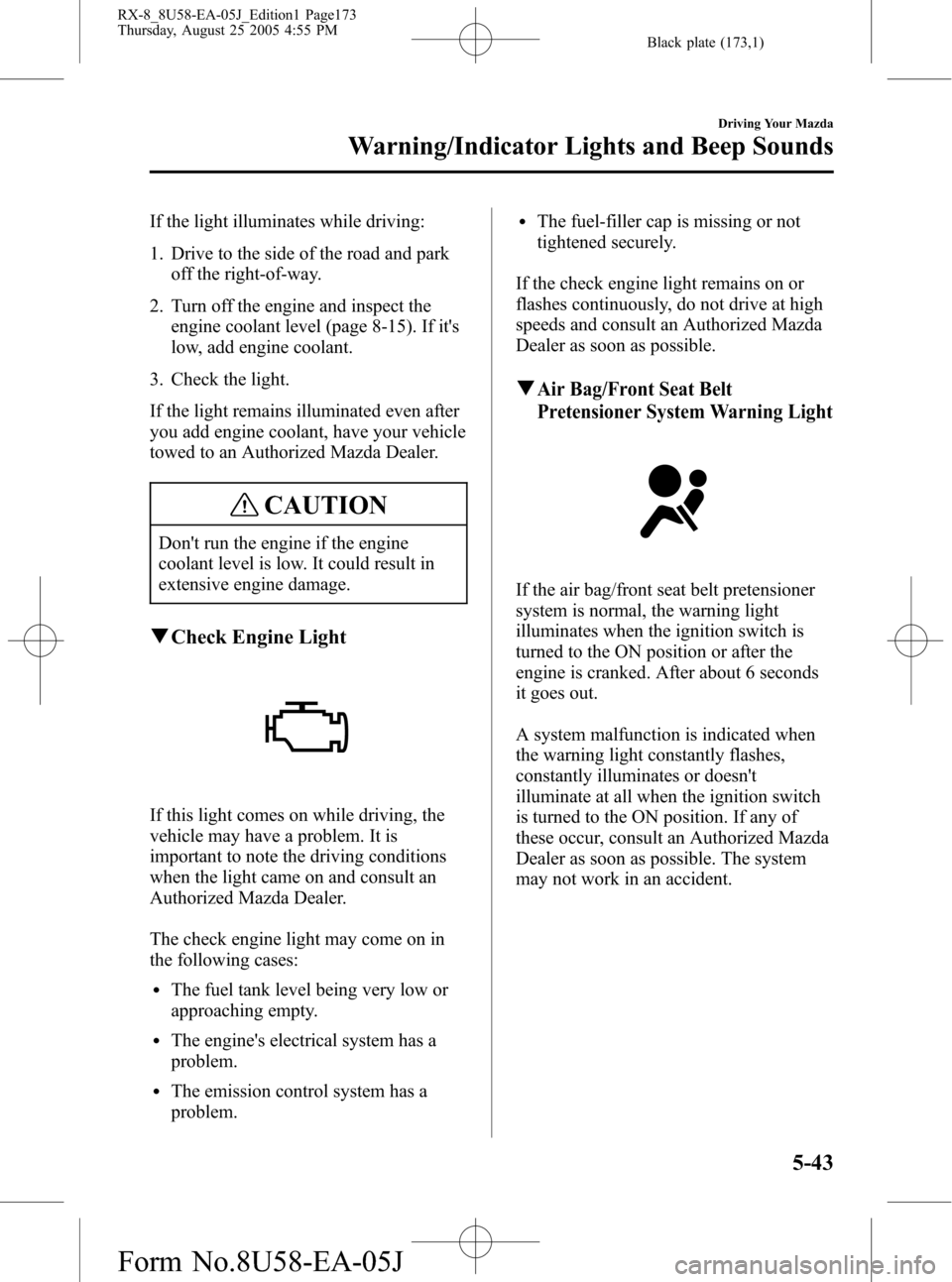
Black plate (173,1)
If the light illuminates while driving:
1. Drive to the side of the road and park
off the right-of-way.
2. Turn off the engine and inspect the
engine coolant level (page 8-15). If it's
low, add engine coolant.
3. Check the light.
If the light remains illuminated even after
you add engine coolant, have your vehicle
towed to an Authorized Mazda Dealer.
CAUTION
Don't run the engine if the engine
coolant level is low. It could result in
extensive engine damage.
qCheck Engine Light
If this light comes on while driving, the
vehicle may have a problem. It is
important to note the driving conditions
when the light came on and consult an
Authorized Mazda Dealer.
The check engine light may come on in
the following cases:
lThe fuel tank level being very low or
approaching empty.
lThe engine's electrical system has a
problem.
lThe emission control system has a
problem.
lThe fuel-filler cap is missing or not
tightened securely.
If the check engine light remains on or
flashes continuously, do not drive at high
speeds and consult an Authorized Mazda
Dealer as soon as possible.
qAir Bag/Front Seat Belt
Pretensioner System Warning Light
If the air bag/front seat belt pretensioner
system is normal, the warning light
illuminates when the ignition switch is
turned to the ON position or after the
engine is cranked. After about 6 seconds
it goes out.
A system malfunction is indicated when
the warning light constantly flashes,
constantly illuminates or doesn't
illuminate at all when the ignition switch
is turned to the ON position. If any of
these occur, consult an Authorized Mazda
Dealer as soon as possible. The system
may not work in an accident.
Driving Your Mazda
Warning/Indicator Lights and Beep Sounds
5-43
RX-8_8U58-EA-05J_Edition1 Page173
Thursday, August 25 2005 4:55 PM
Form No.8U58-EA-05J